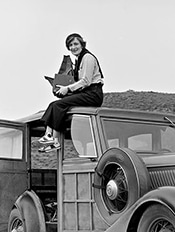 Dorothea Lange. Photo source: Rondal Partridge Farm Security Administration / Office of War Information / Office of Emergency Management / Resettlement Dorothea Lange. Photo source: Rondal Partridge Farm Security Administration / Office of War Information / Office of Emergency Management / Resettlement Dorothea Lange’s ability to capture, and humanize, the hardship and struggles during the American Great Depression, made a lasting impact in the field of photojournalism and documentary photography. Furthermore, by capturing what she saw, and sharing it, others were able to not only see, but empathize with trials of the time. Early Years Born in 1895 as Dorothea Margaretta Nutzhorn in Hoboken New Jersey, Dorothea was raised by parents who placed value on education and creativity. Her father was a lawyer and her mother stayed at home to raise Dorothea and her brother, Martin. At the age of seven, Dorothea contracted Polio, which left her right side weakened for life. Though traumatic, Dorothea said the illness made a lasting impact on who she became as a woman. “It formed me, guided me, instructed me, helped me and humiliated me,” Lange once said. The experience and its lasting impacts helped Lange empathize with those she photographed later in her live. In her early teens, Dorothea’s parents divorced and resulted in a falling out that led Dorothea to drop her father’s last name and assume “Lange,” her mother’s maiden name. Lange graduated from a high school for girls and wen on to study photography at Columbia University. During this time, Dorothea took on apprenticeships with influential photographers, such as the esteemed Arnold Genthe, a portrait photographer, and took classes taught by Clarence Hudson White. Making Career Strides In 1918, Dorothea left New York for San Francisco where she opened up her own portrait studio. In 1920, she married painter Maynard Dixon, and the couple went on to have two sons, Daniel and John. With a tumultuous political economic climate, Dorothea stepped from inside her studio and took her camera outside. She began by photographing events occurring on the streets around her - from strikes to breadlines. In fact, in 1933, her studies of the times led to White Angel Breadline, which showed a man turned away from a soup kitchen. Her photograph not only caught the attention of other photojournalists, but led to the beginning of Dorothea’s career with what eventually became the Federal Security Administration. In 1935, Dorothea divorced Dixon and married Paul Taylor, a University of California at Berkeley professor of economics. Over the next half decade, the two traveled and documented poverty and hardship with Paul writing reports and Dorothea taking photos. During this time, Dorothea captured Migrant Mother, one of her most known works, which showcases the suffering and despair of a mother -- a feeling experienced by many Americans during the time. Following her work’s truth and success, Dorothea Lange became the first to be awarded the Guggenheim fellowship in 1940. Wartime and Later Years The Office of War Information hired Dorothea to document the internment of Japanese Americans during World War II. After the war, she co-founded Aperture, a photography magazine as well as shot photos for other while known publications such as Life magazine and traveled with her husband Paul to his work related assignments around the world. Though still very active, Dorothea’s health declined in the last two decades of her life, and in October 1985, she passed away of esophageal cancer. Yet, still today, she Dorothea Lange continues to inspire photographers. Dorothea’s images, the truth they showcased and her empathy behind the lens not only made a lasting impact in the field of photography, but her approach and mentality also continues to live on in 21st century documentary and photojournalists.
0 Comments
Your comment will be posted after it is approved.
Leave a Reply. |
Archives
July 2017
Categories
All
|
 RSS Feed
RSS Feed